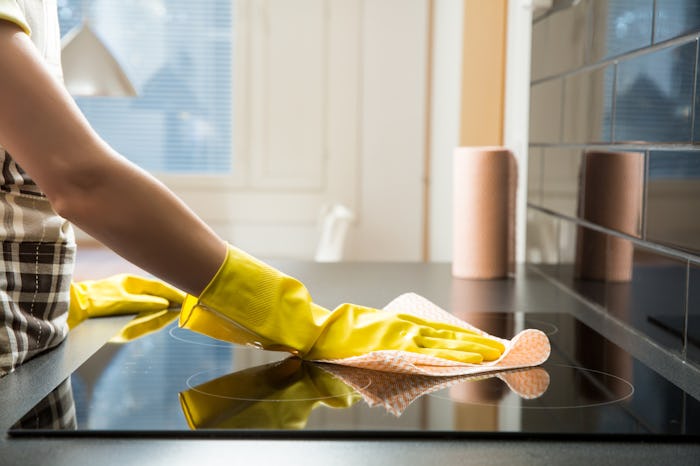Life

These DIY All-Purpose Cleaners Will Help You Clean Up Even The Biggest Messes
Being a parent is often an exercise in figuring out the best ways to get stains out of fabric, slime off the rug, glue from the countertop, and any other number of sticky situations you find yourself in. However, some of the all-purpose cleaners out there are filled with chemicals that you'd rather not have around your little ones, or they're incredibly expensive and the amount of plastic waste they create is terrible for the environment. I often rely on either bulk cleaners or these DIY all-purpose cleaners because I want to know what's in the cleaners, and I don't want to keep filling the landfills and oceans with plastic.
The trick to making a great all-purpose cleaner is to pay attention to your ratios. Too much vinegar and your whole house will stink. Too much citrus and it will get sticky. Adding a natural surfactant like Castile soap or yucca extract is also nice, but you have to be careful which you're going to use as yucca is toxic to dogs and cats, according to the ASPCA.
You have probably heard about recipes containing a lot of the essential oils that one woman you knew from high school is selling on Facebook. Some of these are really great — I personally love the ones with orange and cinnamon in them. That being said, just because something comes from a plant does not automatically make it "natural" or safe. In fact, in order to make one pound of essential oils, it takes about 220 pounds of the botanical itself, noted the National Institutes of Health. It's a hyper-concentrated version of the original.
So with all that in mind, here's how to make yourself some super effective DIY all-purpose cleaners. To get started, there is an initial expense when making these sprays — the receptacle you're using to hold your cleaner. These amber glass spray bottles with labels are good, sturdy glass bottles that spray well, have minimal waste, and are recyclable. They also don't react to anything you put in them or hold the fragrance.
Now, what are you going to put in them?
1If You Like A Sweet Smelling Cleaner
This one is straight from the box of recipes my MawMaw gave me when I got married.
You'll need 2 cups of water, boiled on low with dried geraniums or other flowers for 45 minutes, strained and cooled, and 2 to 2.5 tbsp of liquid Castile soap, unscented. Strain the water well, otherwise the bits will get stuck in the sprayer. Combine in a bowl with the soap and pour into the spray bottle. I also love this mix with much less water used for laundering linens. It smells so good. Also, if you skip the soap and just use the pretty smelling water, you can spritz your sheets with it before bed.
Because you're using a Castile soap, it's great for greasy messes like splattered oil on the stove or peanut butter on the high chair. For a cozy autumn smell, try using scents like vanilla, cinnamon, orange, and ginger.
2Best For Really Sticky Situations
This all-purpose recipe has vinegar and baking soda, which really seems to get the grime out of most things. I add tea tree oil because it smells clean if that makes sense. Sure, there are a lot of people who will tell you that tea tree oil is a magical antimicrobial disinfectant, but the science on that one is sketchy at best. I wouldn't put all my eggs in that basket. However, it smells lovely. For this recipe you'll need 2 cups of warm water, .5 cup white vinegar, 1 heaping tbsp baking soda, and no more than 15 dashes of tea tree oil.
So why does this common recipe work? According to The Kitchn, baking soda both deodorizes and also acts as an abrasive, so it can safely clean up grime and dirt. When it reacts with the vinegar, the chemical reaction "explodes," making it a cleaning machine.
Stir it up, pour it in the bottle, and use it under your baby's high chair, because ew. But you can't use this on stone. Vinegar and stone does not mix, noted the DIY network.
3For Your Stone Countertops
This one stinks, but it's safe for sealed granite countertops, according to The Spruce. Vinegar can't be used to clean them, Windex can't be used, and bleach can't be used. However, a 50/50 solution of isopropyl alcohol and water can be sprayed. Just spray it on, wait a few minutes, and then wipe it with a damp cloth. That's it.
4The One That Really Cleans The Windows
There are tons of recipes out there for homemade glass cleaner and many of them call for ammonia — which is fine — unless you're like me and you freaking hate that smell. Others call for some combination of corn starch and dish soap. My favorite version is this one from the blog, Overthrow Martha, and it not only works really well, it smells great. In my opinion, it's also spectacular for cleaning the outside of your plant pots.